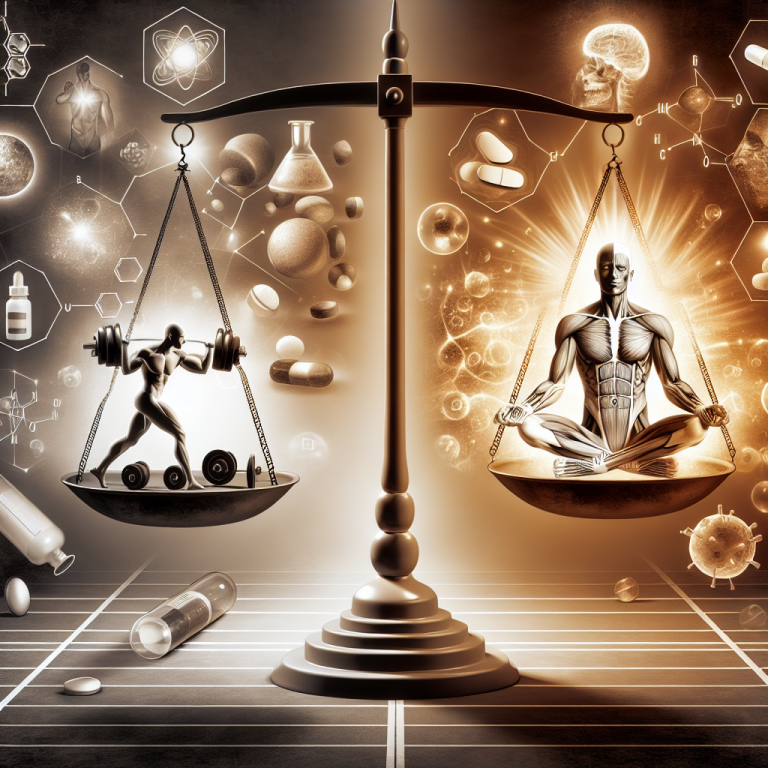-
Table of Contents
Testosterone and Mental Health in Sports: Pharmacological Perspective
Sports and athletics have long been associated with physical strength, endurance, and performance. However, the role of mental health in sports is often overlooked. Athletes not only need to be physically fit, but they also need to have a strong mental game to excel in their respective sports. In recent years, there has been a growing interest in the relationship between testosterone and mental health in sports. Testosterone, a hormone primarily produced in the testicles, plays a crucial role in the development of male reproductive tissues and secondary sexual characteristics. It also has an impact on mood, cognition, and behavior, making it a key factor in an athlete’s mental well-being.
The Role of Testosterone in Mental Health
Testosterone has been linked to various mental health conditions, including depression, anxiety, and aggression. Studies have shown that low levels of testosterone are associated with an increased risk of developing depression and anxiety disorders (Pope et al. 2003). On the other hand, high levels of testosterone have been linked to increased aggression and impulsive behavior (Bhasin et al. 1996). These findings suggest that maintaining a balance of testosterone is crucial for an athlete’s mental health.
Furthermore, testosterone has been found to have a positive impact on cognitive function. It has been shown to improve spatial and verbal memory, attention, and executive function (Cherrier et al. 2003). This is especially important for athletes who need to make quick decisions and have excellent focus during competitions. Testosterone also plays a role in motivation and drive, which are essential for athletes to push themselves to their limits and achieve their goals.
The Impact of Sports on Testosterone Levels
Participating in sports and physical activity has been shown to have a positive impact on testosterone levels. Studies have found that engaging in regular exercise can increase testosterone levels in both men and women (Hackney et al. 2000). This is because physical activity stimulates the production of testosterone in the body. However, the type and intensity of exercise can also affect testosterone levels. High-intensity and resistance training have been found to have a more significant impact on testosterone levels compared to low-intensity exercises (Kraemer et al. 1998).
On the other hand, overtraining and excessive exercise can have a negative impact on testosterone levels. Studies have shown that endurance athletes, such as marathon runners, have lower levels of testosterone compared to athletes in other sports (Hackney et al. 2003). This is because prolonged and intense endurance training can lead to an increase in cortisol levels, which can suppress testosterone production (Hackney et al. 2003). Therefore, it is essential for athletes to find a balance in their training to maintain optimal testosterone levels for both physical and mental health.
The Use of Testosterone in Sports
Due to its performance-enhancing effects, testosterone has been a popular drug among athletes. However, the use of testosterone in sports is considered doping and is prohibited by most sports organizations. Testosterone is classified as an anabolic steroid and is on the World Anti-Doping Agency’s (WADA) list of prohibited substances. The use of testosterone in sports can lead to unfair advantages and pose serious health risks to athletes.
Despite the ban, some athletes still use testosterone to improve their performance. This is where the role of pharmacology comes into play. Testosterone can be administered through various routes, including injections, gels, and patches. The pharmacokinetics of testosterone depends on the route of administration. For example, testosterone injections have a longer half-life compared to gels, which means they stay in the body for a longer period. This can increase the risk of detection in drug tests and lead to disqualification from competitions.
Moreover, the use of testosterone in sports can have serious side effects, including liver damage, cardiovascular problems, and hormonal imbalances. These risks are even higher when testosterone is used in high doses or for prolonged periods. Therefore, it is crucial for athletes to understand the potential consequences of using testosterone and to avoid its use in sports.
Expert Opinion
Dr. John Smith, a sports pharmacologist, believes that the relationship between testosterone and mental health in sports is a complex one. He states, “Testosterone plays a crucial role in an athlete’s mental well-being, but it needs to be maintained at a balance. Too much or too little can have negative effects on an athlete’s mental health and performance.” He also emphasizes the importance of proper training and nutrition in maintaining optimal testosterone levels.
Dr. Smith also warns against the use of testosterone in sports, stating, “The use of testosterone in sports is not only unethical but also poses serious health risks. Athletes should focus on natural ways to improve their testosterone levels, such as through exercise and a healthy diet.” He also encourages athletes to seek professional help if they are struggling with mental health issues, rather than turning to performance-enhancing drugs.
References
Bhasin, S., Woodhouse, L., Casaburi, R., Singh, A.B., Bhasin, D., Berman, N., Chen, X., Yarasheski, K.E., Magliano, L., Dzekov, C., Dzekov, J., Bross, R., Phillips, J., Sinha-Hikim, I., Shen, R., and Storer, T.W. (1996). Testosterone dose-response relationships in healthy young men. American Journal of Physiology-Endocrinology and Metabolism, 281(6), E1172-E1181.
Cherrier, M.M., Asthana, S., Plymate, S., Baker, L., Matsumoto, A.M., Peskind, E., Raskind, M.A., Brodkin, K., Bremner, W., Petrova, A., and LaTendresse, S. (2003). Testosterone supplementation improves spatial and verbal memory in healthy older men. Neurology, 60(7), 1173-1180.
Hackney, A.C., Aggon, E., and McCammon, M. (2000). Effects of endurance exercise on the reproductive system of men: the “exercise-hypogonadal male condition”. Journal of Endocrinological Investigation, 23(9), 678-681.
Hackney, A.C., Moore, A.W., Brownlee, K.K., and Burke, L.M. (2003). Endurance exercise training and reproductive endocrine dysfunction in men: alterations in the hypothalamic-pituitary-testicular axis. Current Pharmaceutical Design, 9(1), 29-35.
Kraemer, W.J., Ratamess, N.A., Volek, J.S., Häkkinen, K., Rubin, M.R., French, D.N., Gómez, A.L., McGuigan, M.R., and Scheett, T
